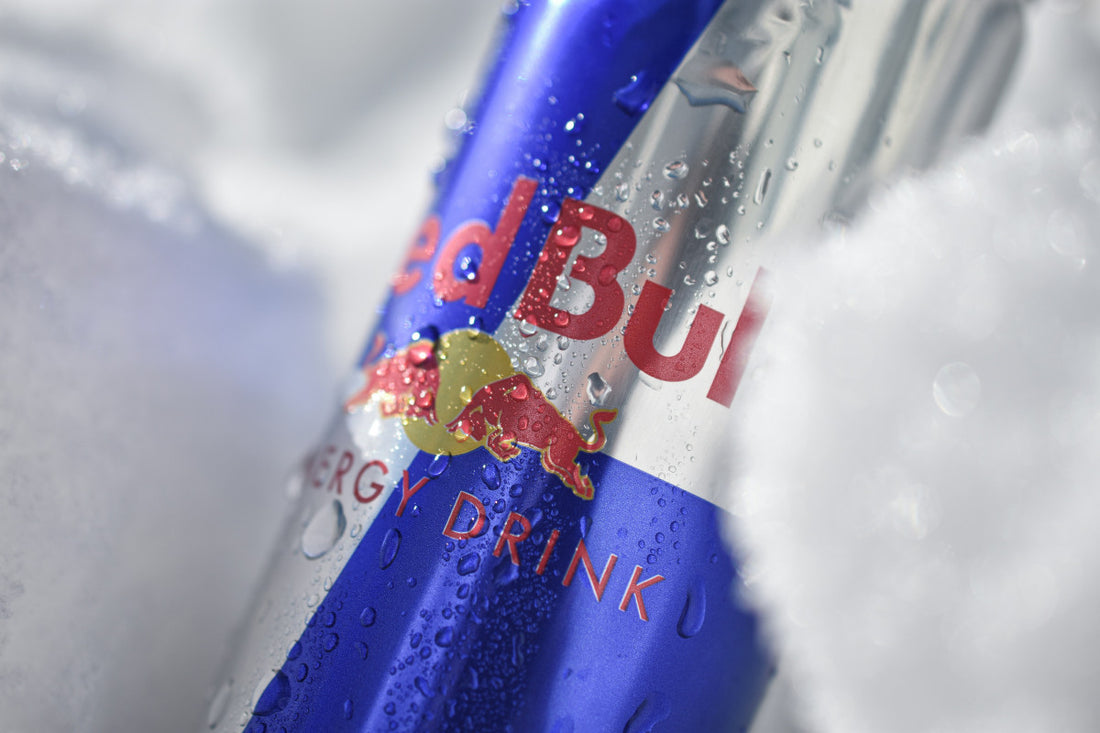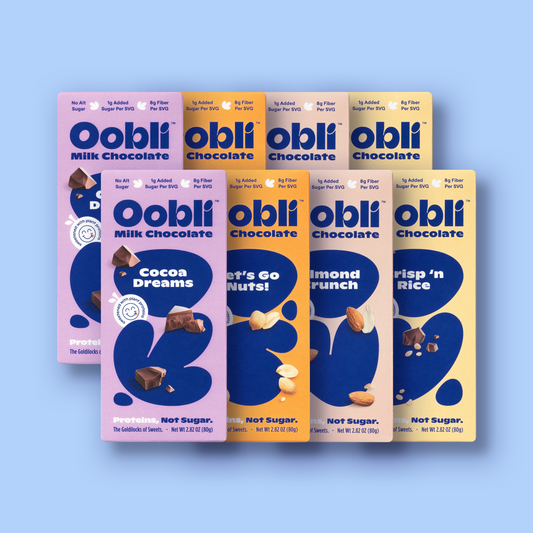Whether you’re preparing for a long road trip or gearing up for the workday, looking for a boost at the gym, or anything else that calls for your undivided attention and focus, Red Bull is a convenient and tasty choice.
While you won’t literally grow wings, you will find yourself enjoying an immediate energy boost - and for some of us, the taste is worth the price alone! What is it that makes Red Bull taste so good, though? Sugar.
The Red Bull sugar content doesn’t just improve the flavor, though, it puts a little pep in your step itself. But how much sugar is in Red Bull exactly? A typical 12-ounce can contains a whopping 37 grams!
Although sugar-free Red Bull and Red Bull Zero Sugar present compelling alternatives for those concerned about the sugar in Red Bull, these may have their own issues you need to be aware of.
We’ll cover all this and more in this quick guide, including a few healthier drink alternatives that still taste great and deliver a swift energy increase without the guilt, right here at Oobli.
Overview of Red Bull
Red Bull has become synonymous with energy drinks worldwide, known for its signature slogan, “Red Bull gives you wings.”
This powerhouse beverage was created in the 1980s by Dietrich Mateschitz and Chaleo Yoovidhya, inspired by functional drinks from the Far East that aimed to provide a mental and physical boost simultaneously.
Red Bull quickly soared in popularity through effective marketing strategies that associated the brand with extreme sports, music festivals, and youth culture. Today, the Red Bull F1 team dominates the pinnacle of motor racing.
You can’t step into a gas station without seeing the cans, which are recognized by their iconic thin silver and blue style. The formulation inside consists of caffeine, taurine, B-group vitamins, sucrose, glucose, and a mix of alpine spring water which combine to enhance performance, especially during physically demanding activities and mentally challenging tasks.
However, the drink has come under scrutiny with some believing it could be doing more harm than good, mainly attributed to the Red Bull sugar content. So, how much sugar is in Red Bull exactly?
How Much Sugar is in Red Bull?
The specific amount of sugar in Red Bull all depends on the specific can you’re consuming. For example, we mentioned the 12oz can contains 37g of sugar. On the other hand, an 8oz can contains 27g of sugar. But if you go for the big boy at 16oz, you’re getting nearly 50g of sugar!
So, is there a lot sugar in Red Bull? Definitely. To put that into context, let’s look at the sugar content of a few other popular drinks:
- Mountain Dew sugar content: 46g of sugar
- Vitamin Water sugar content: 26g of sugar
- Gatorade sugar content: 36g of sugar
This sugar comes primarily in the forms of sucrose and glucose, which are fast-acting sugars that provide the quick energy release Red Bull is known for.
While this might sound like a sweet deal for your taste buds and energy levels, it’s worth considering how this fits into your overall dietary sugar intake, especially if you're reaching for a Red Bull to power through a busy day or a late-night study session.
Is the Red Bull Sugar Content Really That Bad For You?
The amount of sugar in Red Bull is certainly cause for concern, given that the World Health Organization (WHO) has advised that added sugars make up less than 10% of your total daily caloric intake.
For an average adult consuming about 2,000 calories daily, this equates to about 50 grams of sugar. With anywhere from 27g up to 50g of sugar per can, you could be consuming half or your entire limit in a single drink!
But what’s really the problem with sugar - was this tasty ingredient wrongly vilified by our parents growing up just to suck the fun out of things? The implications of overconsuming sugar are actually really concerning.
Regular intake of sugary beverages is linked to various adverse health outcomes, including weight gain, increased risk of type 2 diabetes, and dental problems like cavities.
The rapid spike in blood sugar from drinking a sugary beverage can also lead to a quick surge in energy, often followed by a sharp decline, sometimes referred to as a “sugar crash.” This leaves you feeling tired and less alert than before, which might not be the energy boost you were looking for.
Is Sugar-Free Red Bull Bad For You, Though?
It’s clear that the juice isn’t worth the squeeze when it comes to traditional Red Bull given its jaw-dropping sugar content. Red Bull themselves has recognized that the flagship offering doesn’t align with typical dietary requirements and introduced a sugar-free alternative as a result.
But is sugar-free Red Bull bad for you too, or can you replace the real deal with this style? While you don’t have to worry about sugar, you do have to worry about artificial sweeteners such as aspartame, acesulfame potassium (Ace K), and sucralose.
These mimic the sweetness of sugar without the calories. However, the health implications of these sweeteners are a topic of ongoing debate among health professionals.
For instance, frequent consumption of artificial sweeteners may be linked to changes in gut bacteria and an increased appetite for sweets, potentially leading to weight gain over time.
Meanwhile, some people may experience digestive discomfort, such as bloating or gas, particularly if they consume these sweeteners in large amounts.
The truth is, you’d be hard-pressed to find a way to justify making any Red Bull product a part of your daily routine. But before we introduce a few natural alternatives you can consider, let’s compare Red Bull Zero vs Sugar-Free Red Bull below.
Comparing Red Bull Zero vs Sugar-Free
Wait, Red Bull Zero vs Sugar-Free…what’s the difference? Aren’t both just Red Bull without the sugar? Not quite.
Sugar-free Red Bull was the OG “healthy alternative”, but Red Bull Zero recently popped on the scene seemingly out of nowhere as a “new and improved formulation”. You can technically still get your hands on both varieties, at least, for the time being.
The number of artificial sweeteners used is the main difference. Zero has aspartame, sucralose, and ace K. In contrast, sugar-free Red Bull only has two - it foregoes the use of aspartame.
This leads to variations in taste, of course, but presents the sugar-free variety as a more attractive option for those focused on harm reduction, given the concerns of aspartame which are well documented here in our blog.
So ultimately, these are more or less the same, and soon, it’ll likely be just Red Bull Zero you have access to (unless Coke comes along and takes issue with the name, which they first made famous).
Either way, you’re getting a lot of artificial sweeteners that you probably want to avoid. Still, you need a tasty drink to satisfy that sweet tooth, and it has to be functional enough to get you through the day performing your best. So, where can you turn?
A Few Alternative Drink Choices That Taste Great and Deliver an Energy Boost Without the Sugar
Given all the issues with consuming excess sugar and artificial sweeteners, the unfortunate reality is that Red Bull doesn’t have a place in your regular rotation - at least, not if you take your health seriously.
Fortunately, there are plenty of other delicious drink choices you can choose from when you’re craving something sweet and guilt-free.
In fact, our low-sugar iced tea here at Oobli is an excellent alternative with just 7g of sugar per can and 55g of caffeine, to give you a more sustainable energy boost for any situation!
What makes our low-sugar drinks without artificial sweeteners so special, though? They’re powered by sweet proteins, which are found in fruit (so they’re a natural sweetener). These are exponentially sweeter than sugar, which means we can use just a little bit to achieve the same sweetness. Therein lies the health benefits!
You can indulge guilt-free without stressing about any impact on your blood sugar levels or your caloric intake. But, some of the sweet proteins we’ve formulated our drinks with also have antioxidant, anti-inflammatory, and anti-allergic properties! These are better for the environment, too.
There are a wide variety of flavor options to choose from so you’ll never get bored, and we also have low-sugar lemonade and low-sugar chocolate to satisfy all your cravings without compromising on your wellbeing.
So, what are you waiting for? Order today, taste the Oobli difference, and see for yourself what keeps our customers coming back for more!
Bringing Our Red Bull Sugar Content Guide to a Close
So, how much sugar is in Red Bull? Depending on the size of the can you’re consuming, you could be ingesting as much as 50g of sugar - equalling your daily limit for a healthy adult. The truth is, there’s no justifying this much sugar in a single serving. You’ll end up crashing hard.
Even the sugar-free and zero-sugar Red Bull alternatives have problems in their own right, mainly attributed to artificial sweeteners. The good news? We’ve unveiled a compelling alternative that still packs a potent dose of caffeine without the concerns.
Now that you know all about the amount of sugar in Red Bull, why not see how it compares to a variety of other drinks and snacks? In our mission to create a healthier, happier world, we’ve compiled a list of similar resources:
- Soda sugar content
- Beer sugar content
- Sweet tea sugar content
- Bubble tea sugar content
- Chai tea latte sugar content
- Ginger ale sugar content
- Kombucha sugar content
- Coconut water sugar content
- Kool-Aid sugar content
- Coffee creamer sugar content
- Chocolate sugar content
- Orange juice sugar content
At this point, though, the only thing left to do now that you’re aware of the Red Bull sugar content is replace it with a healthier alternative, which is just a few clicks away at Oobli. Try our variety pack to discover your new favorite guilt-free indulgence today!




